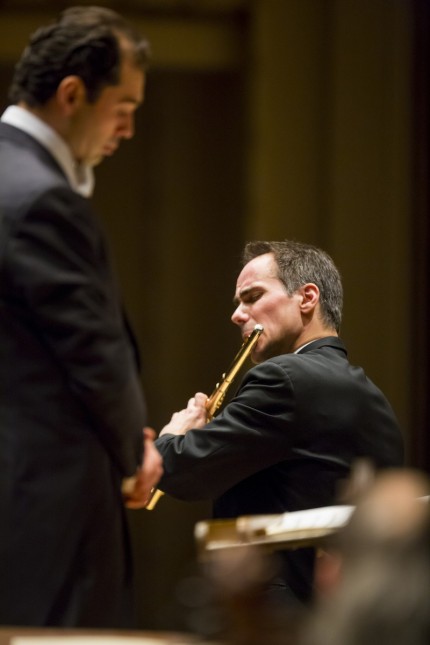Dufour’s virtuosity, conductor’s CSO debut lift a mixed program

Tugan Sokhiev made his Chicago Symphony Orchestra debut Thursday night, leading a pan-Russian program that delivered fiery and largely inspired playing in music of distinctly variable quality.
Sokhiev, music director of the Orchestre National du Capitole de Toulouse, has an unorthodox podium style, directing in swooping circular motions and large gestures. And while the 35-year-old Ossetian’s take on Tchaikovsky’s Symphony no. 4 was at times idiosyncratic Thursday night, it was never less than compelling.
In the fateful fanfare of the first movement, Sokhiev elicited an imposing, powerful blast of brass, but elsewhere his balancing favored strings over winds, unusually so for an Eastern conductor. His extreme tempo fluctuations in the long opening movement were not always convincing, the steep slowdowns sounding as self-conscious as the abrupt burst of acceleration at the movement’s coda.
Yet from the second movement on, Sokhiev and the orchestra seemed to get in gear. The conductor took a more straightforward if stately approach to the Andantino, aided by some evocative, languorous wind solos, and he drew a striking range of dynamics in a notably quick and light-footed take on the Scherzo’s pizzicatos.
While many whip up cataclysmic volume and speed from the opening burst of the final movement, Sokhiev was distinctive here as well, not peaking too soon and rising organically to a fiery and propulsive coda, which earned a rousing ovation.
There are many 20th-century works that are well deserving of revival and wider distribution. Khachaturian’s Violin Concerto isn’t one of them.
Like the Armenian composer’s lumbering Piano Concerto, Khachaturian’s Violin Concerto is a product of the 1940s and enjoyed a fair amount of postwar popularity in the Soviet Union and the West where it benefited from the brief wartime alliance with the West.
Khachaturian’s Violin Concerto has never been heard complete at CSO concerts in its original form (the first movement was played at a 1991 Illinois Young Performers Competition). So, Thursday night, the work made its sort-of debut in Jean-Pierre Rampal’s transcription for flute.
With Mathieu Dufour as solo protagonist there were pleasures to be had, of course, in the polished technical facility, elegant phrasing and fearless bravura of the CSO’s principal flute.
Still, indigenous folk flavoring and surface facility only get you so far, and Khachaturian’s “Flute Concerto,” with its awkward writing, and banal working out of themes is almost embarrassingly pedestrian. The central Andante has some artful folk flavoring in the wind writing (quite well played Thursday) but seems to go on forever, rising to an overblown climax that suggests a 1950s Hollywood Biblical epic.
Dufour made as compelling a case as possible, and Sokhiev kept the volume and unhealthy vulgarity down in regard to his soloist and good taste, but a musical pig is still a pig. Dufour’s refined, beautifully shaded encore of Debussy’s Syrinx was balm to the ears after Khachaturian’s noisy finale.
The evening began with Borodin’s In the Steppes of Central Asia, not heard at a CSO subscription concert since Rafael Kubelik led the last outing in 1953.
Unlike Khachaturian who spins out his slender material to stupefying length, Borodin realized that less is more. This lovely, seven-minute miniature received a high-sheen reading from the orchestra, Sokhiev drawing notably transprent textures and an extremely wide array of dynamics, from the high violin harmonics that open the work to the heart-easing warmth of the main theme.
The program will be repeated 8 p.m. Saturday and 3 p.m. Sunday. cso.org; 312-294-3000.
Posted in Performances


